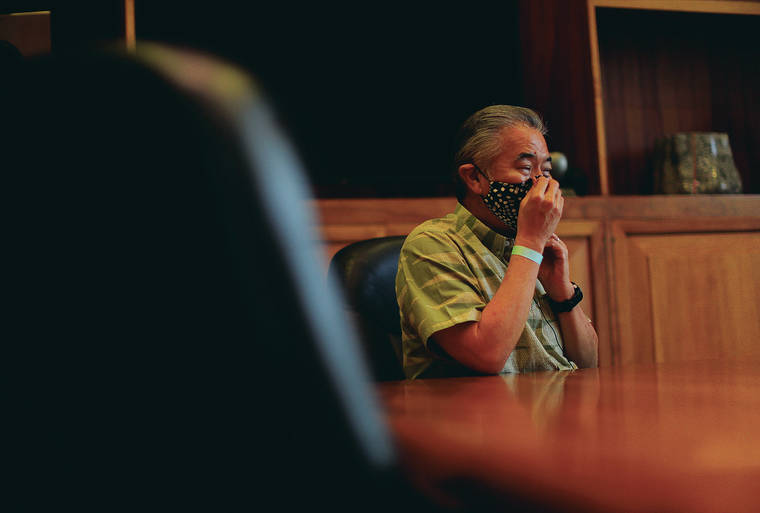Hawaii Gov. David Ige faces public and personal challenges caused by coronavirus pandemic


JAMM AQUINO / JAQUINO@STARADVERTISER.COM
Hawaii governor David Ige adjusts his mask during an interview with the Star-Advertiser on Thursday at the State Capitol in Honolulu.


While Gov. David Ige appreciates the counsel of Hawaii’s former governors, there are 49 active governors spread across the country who understand the pressures Ige faces trying to balance opening the state’s economy to mass tourism against protecting the public’s health in the era of COVID-19 Opens in a new tab.
Ige is a member of both the National Governors Association and the Western Governors’ Association and clearly aligns more politically with governors in Democrat-leaning “blue states” on the West Coast and elsewhere.
But even governors in more conservative “red states” are candid — and less politicized — when they speak to Hawaii’s chief executive in off-the-record conversations alone without staffers present, Ige said.
“I am disappointed that the response to the pandemic has become so politicized,” Ige told the Honolulu Star-Advertiser in an interview last week in his fifth-floor conference room in the state Capitol, while wearing a mask. “It really is not helpful.”
But with a new surge in COVID-19 cases, other governors are more forthcoming and willing to listen to one another as five months of work and tough decisions have been erased in some states.
On July 11, Hawaii health officials reported 42 new confirmed coronavirus cases, the state’s highest one-day total. The number beat the previous high of 41 new cases on July 7.
Don't miss out on what's happening!
Stay in touch with breaking news, as it happens, conveniently in your email inbox. It's FREE!
“We’re back in March again,” Ige said. “The virus is surging again.”
As cases began to increase around Memorial Day and the Fourth of July, “governors were pretty cordial,” Ige said. “It’s about sharing practices and being able to hear what worked and what didn’t work. They’re pretty candid.”
Asked about any recent conversations between President Donald Trump and America’s governors, he said, “We’ve tried not to get political, but it’s clear that it has become political and that’s sad.”
Ige, who is nearly halfway through his second term, talks with the mayors of Hawaii’s four counties three times a week, and even they’re not always in agreement on issues including when to lift Hawaii’s 14-day self-quarantine for incoming travelers, which he extended to Sept. 1 in his 10th emergency proclamation Friday.
Asked about the response from big and small businesses across the islands that have been hobbled and shuttered by the clampdown on tourism, Ige said: “They’re disappointed. They recognize it’s a challenge. … People do see how things are connected. People understand.”
The last five months trying to balance public health with the state’s economy have sometimes been personal for Ige, his office time and off-hours are often overwhelmed with both support and criticism.
Last weekend Ige got a call from the Oahu nursing home that cares for his 99-year-old mother, informing him there had been “a number of infections” and that all residents would be tested.
Ige said his mother is “doing fine,” while praising the nursing home industry for doing “a terrific job.”
But the call — made to Ige just like any family member of a patient would receive — was a reminder of how personal the disease has become.
“This pandemic has touched virtually everybody, every job, every individual — every organization has changed,” Ige said.
It started with the realization that COVID-19 was being spread by passenger arrivals of returning residents and visitors and that a 14-day self-quarantine was needed to help stem the outbreak.
“It became very clear that the virus is introduced in our community by travelers — and lots of them are residents traveling out and coming back,” Ige said.
So “a mandatory quarantine was the only way for us to be able to control it, and it was certainly something I could control,” he said.
But with a local tourism industry headed toward another potential record year of 10 million visitors or more, the decision to virtually shut down Hawaii’s main economic engine was hardly easy.
“Initially sleeping was a big challenge,” Ige said.
Now he’s learned a couple of ways to cope and clear his head.
At least two times a week, Ige tries to get in a 4-mile run, “which gets the heart beating and the blood pumping.”
And he now varies his trips to different grocery stores and Longs Drugs when both are likely to be less crowded.
As a result, Ige said, “I get a lot more sleep recently.”
But as the father of three millennials, Ige remains frustrated at how to get more young adults to wear masks indoors and out to help prevent the spread of COVID-19 — and the best way to reach them.
“They’re informed, they’re not off the grid — how do you inform them?” Ige asked.
He’s particularly puzzled that more younger people don’t wear masks and maintain social distancing in Hawaii despite what Ige calls their overall “commitment to community” and desire to “work for a broader mission. … They want to have a cause. They want a job that aligns with their personal views. How do we reach them?”
Despite sleepless nights early on in the pandemic, the constant critiques wherever he goes and the challenge of balancing public health with the economy, Ige praised the public’s overall reaction to all that’s happened.
“I’m proud to be governor of the state of Hawaii,” he said.




